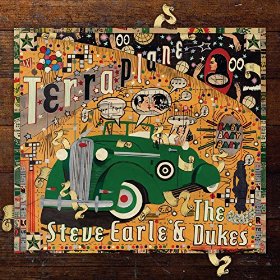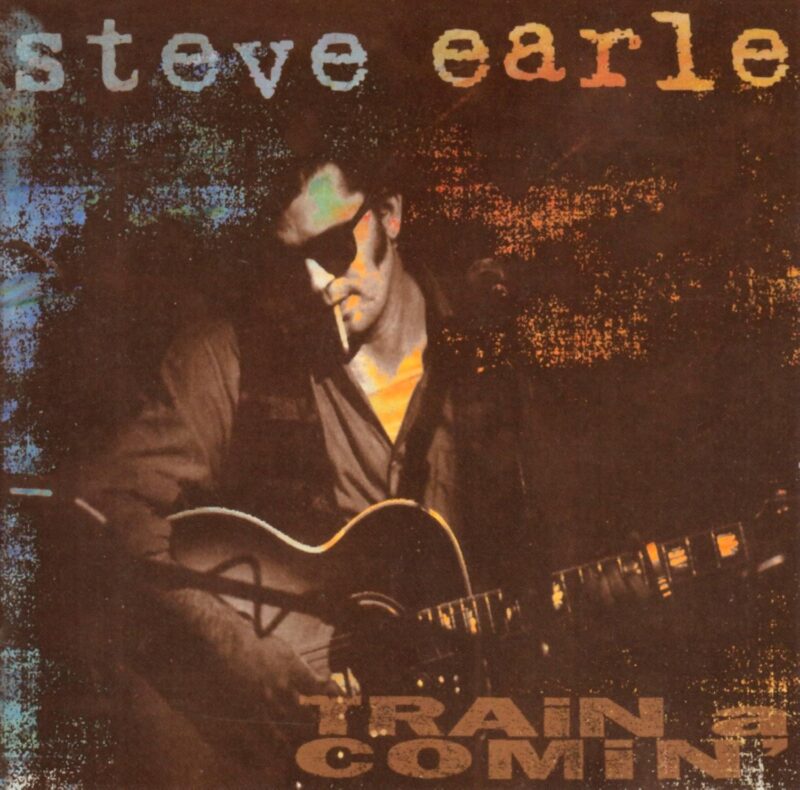
In 1974, aged 20, Earle hitchhiked to Nashville to find one of his favourite songwriters, Guy Clark. Earle managed to blag a role in Clark’s band as a bassist and played on his 1975 album “Old No. 1″. Although Earle has been a musician since then, his debut long player didn’t actually come out until 1986 when he was 31 years old. Until the early 1980s, Earle had been content getting by as a jobbing songwriter in Nashville. In 1975, Elvis Presley almost recorded one of Earle’s songs entitled ‘Mustang Wine’. However, Elvis never made it to the session, so the track was recorded by Carl Perkins and it eventually saw the light of day in 1978.
In the 1990s, Earle became addicted to heroin. To feed his drug habit he sold his motorcycles, cars, guitars, and jewellery. To quote Earle, “I lost everything but my house. I guess it’s because I couldn’t figure out how to put it in the car and take it to the pawn shop”. In 1993, Earle was arrested for possessing heroin and in 1994 for the possession of cocaine and firearms. He lost his recording contract. After serving 60 days of a one-year sentence, Earle became clean, sober and more prolific than ever. Over the past 20 years, he’s released 18 studio albums, played 100s of gigs, hosted a weekly radio show, campaigned to abolish the death penalty, written a novel and directed a play, to name just a few of the activities he’s been involved with. These days Earle resides in New York and wakes up at 6 am, does some yoga and then takes his son, John Henry, to school on the subway. Among those 20 albums was something of a side project, when Earle tried something that was really quite outside his normal direction, though given his occasional move away from folk- and country-rock (viz his bluegrass venture “The Mountain”), it was hardly a complete surprise. Nevertheless:
Can’t Live With It: “Terraplane” (2015)
 “Terraplane” is Earle’s Texas blues album; it’s a tribute to artists such as Lightnin’ Hopkins, Stevie Ray Vaughn, ZZ Top and Robert Johnson, whose ‘Terraplane Blues’ is referenced in the title. All the songs were composed by Earle. I have to admit that I am not a massive fan of the blues, however, I don’t think that’s the reason that this album doesn’t do it for me. To these ears it sounds slightly tired and as if Earle is going though the motions, there’s a slight sense of boredom. Most of the songs were written when Earle toured Europe alone “with a backpack”, after the breakdown of his marriage to Allison Moorer so maybe that’s got something to do with it.
“Terraplane” is Earle’s Texas blues album; it’s a tribute to artists such as Lightnin’ Hopkins, Stevie Ray Vaughn, ZZ Top and Robert Johnson, whose ‘Terraplane Blues’ is referenced in the title. All the songs were composed by Earle. I have to admit that I am not a massive fan of the blues, however, I don’t think that’s the reason that this album doesn’t do it for me. To these ears it sounds slightly tired and as if Earle is going though the motions, there’s a slight sense of boredom. Most of the songs were written when Earle toured Europe alone “with a backpack”, after the breakdown of his marriage to Allison Moorer so maybe that’s got something to do with it.
The stand-out track is ‘Tennessee Kid’. It’s shaggy dog story of meeting the devil at a crossroads which unsurprisingly namechecks ‘Bob Johnson’, as Earle refers to him. Maybe it’s my least favourite Steve Earle album because it comes across as slightly self-indulgent. Just in case the listener has forgotten that this is a Blues album, the last two songs are ‘Gambling Blues’ and ‘King of the Blues’. There’s also the overuse of the word ‘Baby’ which seems to appear in every other track, which I find grates, the first song is even entitled ‘Baby Baby Baby (Baby)’. Pitchfork’s review of the album summed it up better than I can. They said that, “It’s good for what it is – better than it needs to be, in fact – yet what it is is only a fraction of what it could be, if only Earle would stop trying to tidy up his inspirations”. Still the worst of Earle’s 21 studio albums is still better than many other artists manage in an entire lifetime.
Can’t Live Without It: “Train A Comin’” (1995)
For many people their go-to Steve Earle album would be either “Guitar Town” or “Copperhead Road”, both of which are mighty fine records. However, for me it’s “Train A Comin’’. It’s an acoustic classic. Released when MTV Unplugged albums were very much in vogue, Earle made it very clear on the sleeve notes that he saw no connection with the music channel, writing, “This is what I used to do and it is what the great players on this record do every day of their lives come hell or high water; make no mistake, this ain’t no part of no unplugged nothin’. God I hate MTV”.
 Accompanying Earle on “Train A Comin’ “is a crack team of musicians comprising Grammy-winning bluegrass maestros Peter Rowan on mandolin, Norman Blake on guitar and Roy Huskey Jr. on bass, with Emmylou Harris contributing backing vocals on a couple of tracks. Earle himself was also in fine form. It could have all gone horribly wrong, there’s a mishmash of old and new original Earle songs, plus interesting cover versions; however, it hangs together as a beautifully coherent body of work. I must confess that I think that Earle’s bluegrass-tinged take on The Beatles’ ‘I’m Looking Through You’ is better than the Mop Tops’ version, however, I realise this will probably incur the wrath of fans of the Fab Four.
Accompanying Earle on “Train A Comin’ “is a crack team of musicians comprising Grammy-winning bluegrass maestros Peter Rowan on mandolin, Norman Blake on guitar and Roy Huskey Jr. on bass, with Emmylou Harris contributing backing vocals on a couple of tracks. Earle himself was also in fine form. It could have all gone horribly wrong, there’s a mishmash of old and new original Earle songs, plus interesting cover versions; however, it hangs together as a beautifully coherent body of work. I must confess that I think that Earle’s bluegrass-tinged take on The Beatles’ ‘I’m Looking Through You’ is better than the Mop Tops’ version, however, I realise this will probably incur the wrath of fans of the Fab Four.
Although the album contains nine Earle originals, many of these had been written in his youth. There’s only one new song on the record, ‘Goodbye’, which was the first song Earle wrote after kicking drugs and becoming sober. He often introduces it as “a ninth step in the key of C”, referring to the “step” in which an addict seeks to make amends. Emmylou Harris recorded it the same year on her Grammy-winning album “Wrecking Ball”.
The old songs are all great and often rooted in the America of the 19th century. ‘Tom Ames’ Prayer’ is the tale of an outlaw who, in a moment of despair turns to God, but ends up relying on his pistols to get him out of trouble or ‘Ben McCulloch’, a ruthless brigadier-general in the army of the Confederate States during the American Civil War, who’s described in the song by one of two brothers, who are in the ‘Devil’s infantry’ which he leads.
Although after his incarceration Earle had stayed on the straight and narrow, the release of “Train A Comin’” didn’t occur without some controversy. The record label re-sequenced the album so that it commenced with ‘Hometown Blues’ rather than ‘Mystery Train Part 2’, without Earle’s permission. It’s alleged that Earle was so furious about this, that he took a 0.50 calibre rifle and promptly shot a hole in an advance copy of the record, whilst boasting to Townes Van Zandt about his great aim. The track listing was eventually changed. Hopefully Van Zandt got to hear Earle’s beautiful version of his song ‘Tecumseh Valley’ before the record was smashed.
This album rebooted Earle’s career and saw him produce a fine run of albums including “I Feel Alright”, “El Corazón”, “The Mountain” and “Jerusalem”, as well as becoming more accomplished and productive than ever. Fortunately, Earle’s still out there playing great shows and releasing some excellent records, long may it continue.



Love the “Train a Comin” album. Played it constantly while reading Lauren St John’s book… twenty years… no! Right behind on the Beatles track too. Thanks, digging it out now.
“Transcendental Blues” is mighty fine, too. https://youtu.be/GZIhZoGRsNw